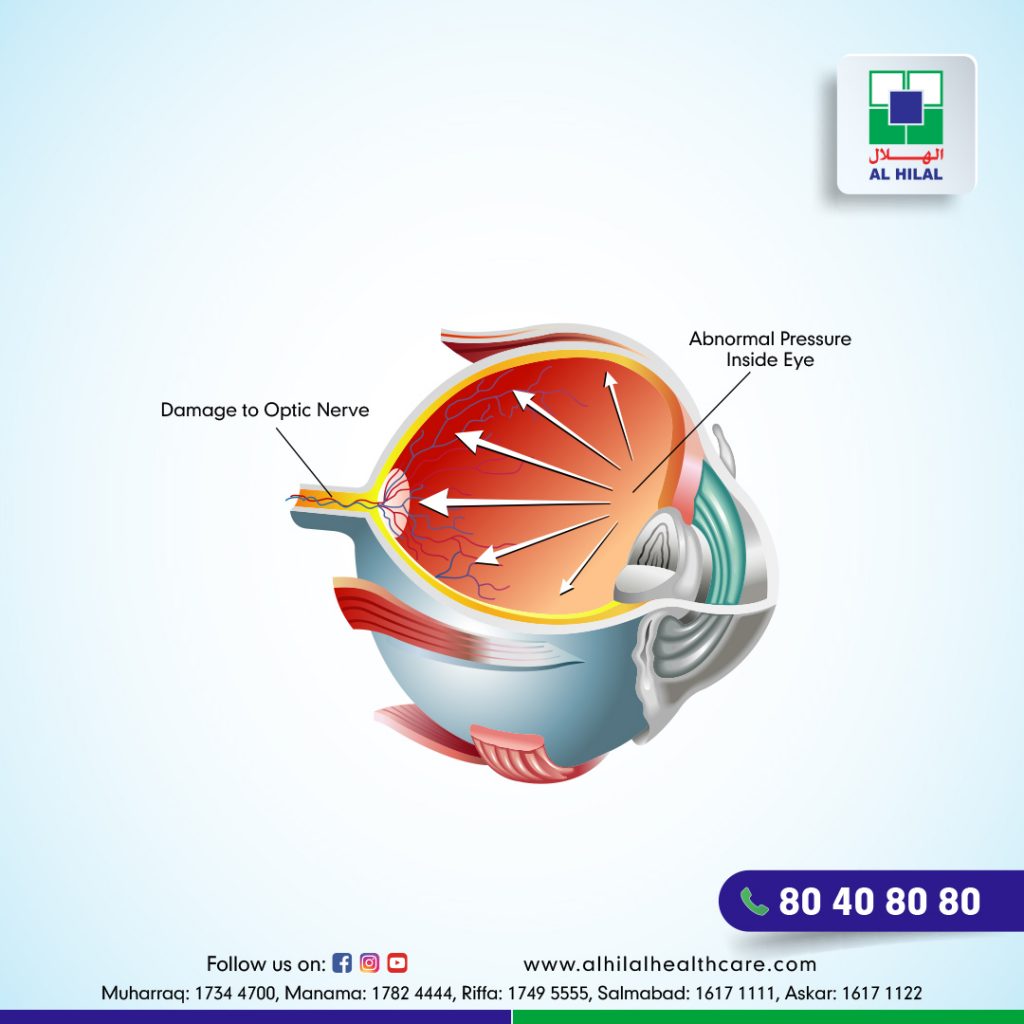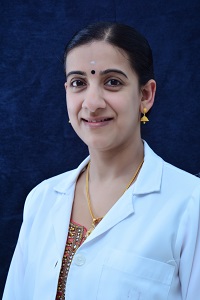Glaucoma could be described as a common eye condition in which the optic nerve (that connects eye to the brain) gets damaged. The damage is usually caused by fluid build-up in the front part of eye, causing an increase in pressure inside the eye. If not diagnosed and treated early, glaucoma can lead to loss of vision as well. While glaucoma can affect individuals of all ages, adults in their 70s and 80s are most prone to the condition.

Click here for more information about Glaucoma– by expert Ophthalmologist in Al Hilal Hospital, Bahrain. For consultation regarding glaucoma or any other eye-related issue, contact Al Hilal Hospital, Department of Ophthalmology today and get an appointment with the best ophthalmologist in Bahrain. For your convenience, our representatives are also available on WhatsApp helpline, in Al Hilal Manama, Salmabad, Riffa and Muharraq branches.
Causes of Glaucoma
Glaucoma develops when optic nerve is damaged, gradually deteriorating and developing blind spot in the vision. The damage is related to fluid built-up and consequent increase in pressure within the eye. The fluid is known as aqueous humor, and it flows freely within the eye, draining through a tissue present where cornea and iris meet- known as trabecular meshwork. Cornea allows light to enter the eye, making vision possible, and when the eye is making excess fluid or the drainage isn’t working properly, an increase pressure might develop, leading to damaged nerve.
Other causes of glaucoma/ glaucoma risk factors include:
- Intraocular pressure- high internal eye pressure
- Age above 55
- Hispanic, black, or Asian heritage
- Glaucoma family history
- Some medical conditions, including migraines, diabetes, sickle cell anemia and high blood pressure
- Thin center of cornea
- Extreme farsightedness of nearsightedness
- Certain types of eye or ear surgeries
- Use of corticosteroid medicines for long period of time, especially eye drops
- Narrow drainage angles in some individuals, increasing risk of angle-closure glaucoma
What is the First Sign of Glaucoma (Glaucoma Symptoms Early)
For early diagnosis, everyone should know what is the first sign of glaucoma/ what are glaucoma symptoms early- specially for high risk individuals. The early symptoms of glaucoma include:
- Loss of side or peripheral vision- this is usually the first sign of glaucoma
- Seeing rainbow-colored circles (halos) around light
- Unusual sensitivity to light
- Sudden loss of vision
- Redness and pain in the eye can also indicate infection, injury, or acute glaucoma.
- Hazy looking eyes- cloudy looking cornea is a common sign of early childhood glaucoma
- Vomiting or nausea accompanied by severe eye pain
- Pain in eye and head- usually occurs in angle-closure glaucoma
- Tunnel vision- loss of vision around edges of vision field
If you are having any of the above-mentioned symptoms, click here for more information about Glaucoma, by expert Ophthalmologist in Al Hilal Hospital, Bahrain.
For early diagnosis and treatment of glaucoma and other eye-related diseases, contact Al Hilal Hospital, Department of Ophthalmology today. Our representatives are also available on WhatsApp helpline, in Al Hilal Manama, Salmabad, Riffa and Muharraq branches.
Glaucoma Types
Following are most common glaucoma types
Open-angle glaucoma
The most common type of glaucoma. In open-angle glaucoma, the drainage angle created by iris and cornea remain open, however, other parts of drainage do not function properly. It leads to gradual and slow increase in eye pressure.
Angle-closure glaucoma
It happens because of bulging of iris, that blocks the drainage angle, partially or completely. This prevents the fluid from circulating through the eye and hence results in increased pressure. Angle-closure glaucoma can happen gradually or suddenly.
Normal-tension glaucoma
The exact reason for optic nerve damage with normal eye pressure is not known- possible reasons include increased sensitivity or decreased blood flow. The limited blood flow might be caused due to buildup of fatty deposits within arteries (also called atherosclerosis), or other conditions that cause damage to circulation.
How to Prevent Glaucoma
Most types of glaucoma cannot be prevented; however, early detection and management can minimize the loss of vision. If you are looking for ‘how to prevent glaucoma’, it is advised to take the following precautionary measures:
- Getting regular eye examination can allow early detection and hence better management options for glaucoma
- Glaucoma runs in family- if you have family history of glaucoma, you need more frequent screening
- Use eye-protection while playing sports and using power tools, as serious eye injuries increase risk of glaucoma
- Use prescribed eye-drops regularly to reduce the risk of high eye pressure that might lead to glaucoma. If prescribed by healthcare professional, continue to use the eye-drops even if you do not have any symptoms.
Can Glaucoma be Cured?
The answer to ‘can glaucoma be cured?’ is, unfortunately, no. There is no cure yet for glaucoma, however if detected early, vision loss can be prevented, and vision can be preserved. Knowing about glaucoma risk, getting regular check-ups, and complying by other precautionary measures can reduce the risk of getting glaucoma, and can also make glaucoma management possible.
Take better care of your eyes using information by our expert Ophthalmologist, available here.
Glaucoma Treatments
The loss of vision that occurs before diagnosis of glaucoma treatment cannot be reversed, however, glaucoma treatments can stop further loss of vision. The treatment options depend on type of glaucoma; however, the most common ones are:
- Eyedrops– assist in reducing pressure in the eyes
- Laser treatment– for reduction in production of fluid in eyes and opening the blocked drainage tubes
- Glaucoma surgery– drainage of fluids can be improved by glaucoma surgery
Al Hilal Hospital, Department of Ophthalmology
If you are at high risk of glaucoma, or having symptoms of glaucoma, consult an Ophthalmologist at the earliest. At Al Hilal Hospital, Department of Ophthalmology, we have highly qualified and experienced Ophthalmologist, modern equipment, and state-of-the-art laboratories, to provide early detection and treatment options for glaucoma patients. We also offer eye-testing services and treatment options for glaucoma, to ensure early detection and management of the disease. Contact Al Hilal Hospital, Department of Ophthalmology, and get consultation with the best Ophthalmologist in Bahrain for glaucoma and all other eye diseases and conditions. For your convenience, our representatives are also available on WhatsApp helpline, in Al Hilal Manama, Salmabad, Riffa and Muharraq branches.


